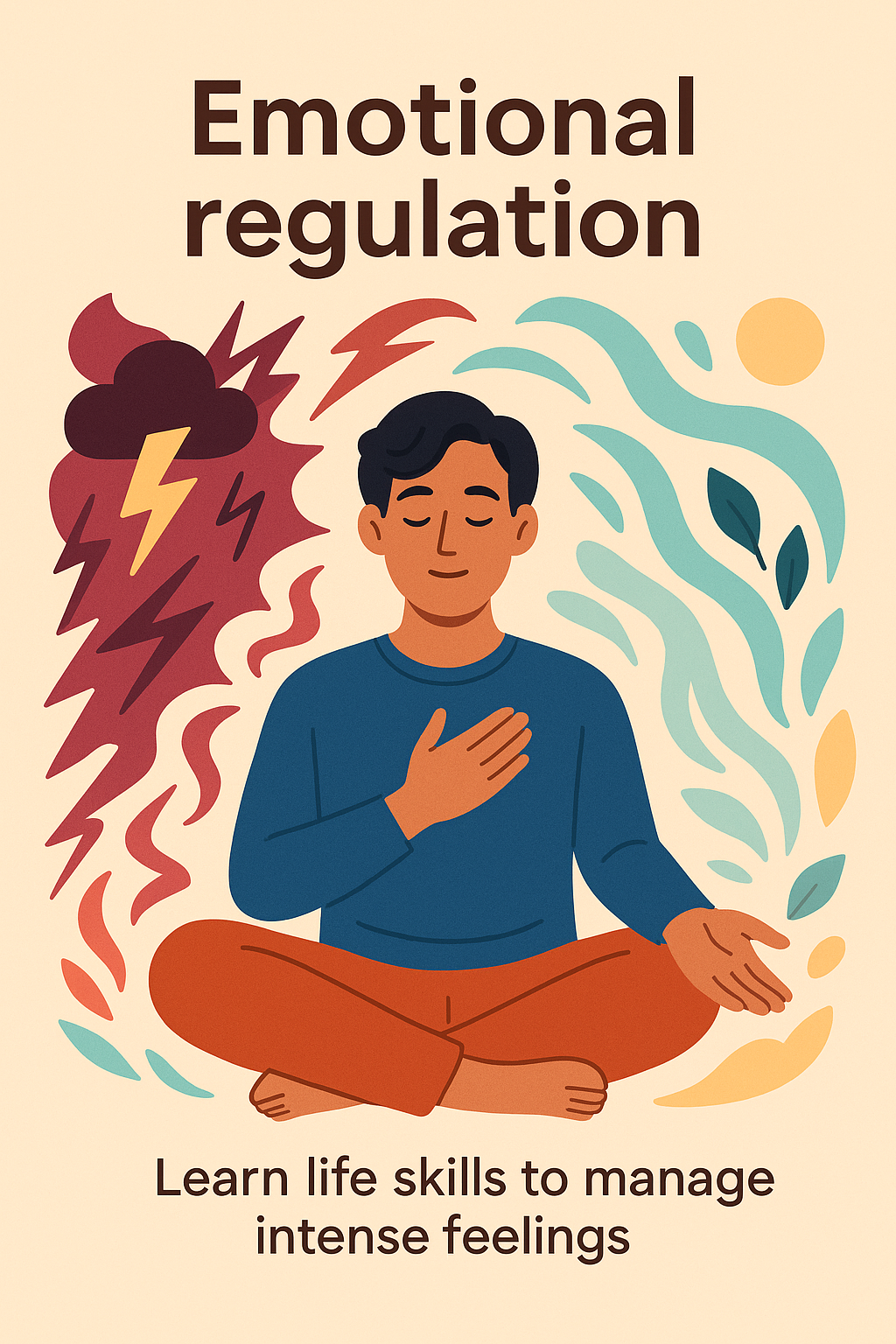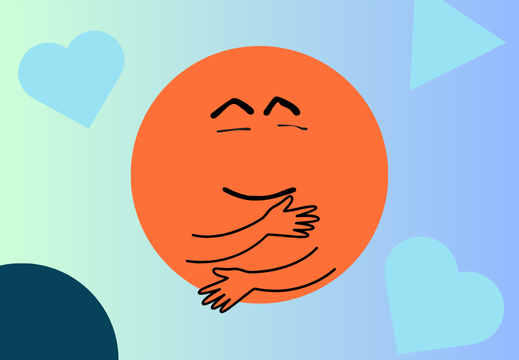
Emotional Regulation at Work — Because "Just Don't Take It Personally" Isn't A Strategy
30-min reset for when feelings are controlling everything | Works in 🔴red zone | AI support 24/7
Got feedback yesterday. Cried in the bathroom for 20 minutes, then composed a resignation letter I'll never send, then couldn't focus for three hours. Then felt shame about crying. Then shame about the shame. 76% of workers say stress negatively affects their health and honestly that feels low because I'm at like 140% right now.
This is the thing nobody tells you about emotional regulation at work: the initial emotion isn't the problem. It's the three-day aftermath where you replay every word, rewrite reality fifteen different ways, and convince yourself everyone secretly thinks you're incompetent.
Your body treats criticism from your manager exactly like it treats physical danger. Same cortisol spike. Same amygdala activation. Except you can't run away and you can't fight back, so you just sit there while your nervous system screams at maximum volume and pretends you're fine.
Currently in 🔴red zone writing this (had feelings about having feelings about this pillar page), so if the quality degrades as we go, that's why.
What's actually happening (and why "stay professional" doesn't work)

Your brain didn't evolve for quarterly reviews - it evolved for actual survival threats. When someone criticizes your work, your amygdala can't tell the difference between "this needs revision" and "you're about to be exiled from the tribe and die alone."
The acceptance-based stuff (ACT framework, if you want the technical term) shows that trying NOT to feel emotions makes them worse. It's like holding a beach ball underwater — takes all your energy, and the second you slip, it explodes to the surface.
Most emotional intelligence training assumes you're starting from 🟢green zone — functional, capable, able to use cognitive strategies. But if you're reading this at 2am because someone was slightly short with you in Slack five hours ago, you're not in 🟢green zone. You're in red, maybe can't-even.
For ND brains (ADHD, autistic, highly sensitive people), this is amplified by about 1000%. Rejection Sensitive Dysphoria means criticism doesn't land as "feedback on this specific thing" — it lands as "you exist wrong and everyone has always known it." Your brain doesn't have whatever filter neurotypical people use to separate "the project needs work" from "I am fundamentally unlovable."
Which is why every $1 invested in mental health intervention returns $4 in productivity, but that stat doesn't help when you're currently spiraling. If the emotional flood keeps happening and you need better boundaries between work stress and your actual life, that's a different (but related) skillset.
Yeah yeah, the ROI stat. $1 equals $4, whatever. Try telling that to my nervous system at 2am.
What emotional mastery actually means
Not becoming a robot. Not toxic positivity. Not "good vibes only."
Moving THROUGH emotions instead of getting stuck in them or avoiding them entirely.
We built two main tools for this. The Label-Locate-Release Method is 90 seconds when you're mid-flood and can't access higher reasoning. The RSD Recovery Protocol is specifically for that particular type of rejection sensitivity where one comment ruins your entire week.
Everything scales by zone:
🔴Red zone = circuit breakers, immediate regulation when flooded
🟡Yellow zone = catch the spiral before it starts
🟢Green zone = build flexibility when you have capacity
⚫Can't-even = bare minimum, you don't even have to feel your feelings right now
This isn't therapy. Therapy helps, you should probably do therapy. This is "I have a meeting in 15 minutes and I'm currently having a panic attack in a bathroom stall" practical.
About 75% of people report faster recovery from emotional triggers within two weeks. The rest need more reps or are dealing with actual trauma that needs professional support. Some days you nail it. Other days (yesterday) you cry anyway. The goal isn't perfection, it's cutting the three-day shame spiral to three hours.
Emotions aren't the enemy. Getting stuck in them is.
What you actually get
Not revealing the full methods here because that's what the subscription is for, but:
The Label-Locate-Release Method
Name the emotion, find it in your body, let it move through. Takes 90 seconds if you do it right. Sounds simple, incredibly hard when your chest is tight and your face is burning.
RSD Recovery Protocol
Specific steps for when rejection sensitivity turns "needs improvement" into "proof I should quit my job and move to the woods."
Pattern mapping
Why certain triggers hit you harder (usually childhood stuff, honestly)
Real scripts
For when someone asks "are you okay" and your brain completely blanks
AI coach integration
Because emotions don't wait for business hours and neither should support
Zone-based tools
Different capacity = different strategies, we don't pretend you can meditate your way out of a panic attack
Who this is for
You get feedback and immediately start job searching even when the feedback is neutral. Spend more energy managing your emotional reaction than solving the actual problem. Can't separate "I made a mistake" from "I am a mistake."
You're a manager avoiding necessary conversations because you're worried about how people will react. Watching talented people self-sabotage because they can't handle any criticism. Want psychological safety but don't know how to build it when everyone's terrified.
You have RSD and need tools that acknowledge emotional intensity isn't weakness or overreaction. Your nervous system works differently and most emotional regulation advice assumes it doesn't. When criticism triggers days of spiraling, rebuilding core confidence becomes essential.
Enterprise/L&D: Emotional regulation directly correlates with leadership advancement. Mental health costs $1.1 trillion in lost productivity annually. This isn't soft skills, it's competitive advantage.
The money part (because someone has to pay for this)
If criticism eats three days of your week in emotional spirals, that's 60% of your productive time gone to recovering from feelings.
Every $1 invested in mental health intervention returns $4 in productivity. Not abstract — that's your weekend, your energy, your ability to take risks without three-day shame hangovers.
Personal scale: Leaders who recover quickly from emotional triggers advance faster. The difference between "needs 48 hours to process feedback" and "processes it in real-time" is the difference between individual contributor and director-level roles.
You're already paying for poor emotional regulation. In confidence. In career advancement. In the mental bandwidth you waste managing feelings instead of doing actual work.
How this connects to everything else
Emotional regulation isn't standalone. From the framework:
- Emotional ↔ Stress — can't manage stress when emotions flood everything
- Emotional ↔ Self-Worth — shame spirals about having emotions destroy self-worth
- Emotional ↔ Confidence — can't take risks when emotions feel unpredictable
This is the foundation everything else sits on. You can't reset, build, or thrive while drowning in shame about being human.
Start here
First 30 minutes free. No credit card. Actually free.
I know that sounds suspicious in 2025 but we built this for ourselves first and figured out the business model later.
Or see full 10-pillar curriculum or talk about enterprise implementation
The bias keeping you stuck
Emotional reasoning: "I feel it so it must be true."
Your anxiety says you're failing. Your shame says you're unworthy. Your anger says someone wronged you. But feelings aren't facts — they're information, and sometimes that information is inaccurate.
When YOU make a mistake: "I'm a failure" (character flaw)
When SOMEONE ELSE makes a mistake: "they had a bad day" (circumstance)
Emotional mastery is treating yourself with the same generosity you give others.
Zone context: Red (flooded) and can't-even (numb). Tools scale to whatever capacity you have right now.
Route context: Works for both ND route (regulation before cognition, built for emotional intensity) AND NT route (challenging the stories that make emotions worse). Under stress, NT brains need ND tools too—when executive function drops, everyone needs sensory grounding and external structure.
Path integration: Enables reset → build → thrive. Can't do any of it while drowning.
Keep going
All 10 pillars live in the Emergent Skills subscription. First 30 minutes free. Next breakthrough starts now.
Had three emotional regulation failures while writing this emotional mastery page. Finished it anyway. That's the actual skill.